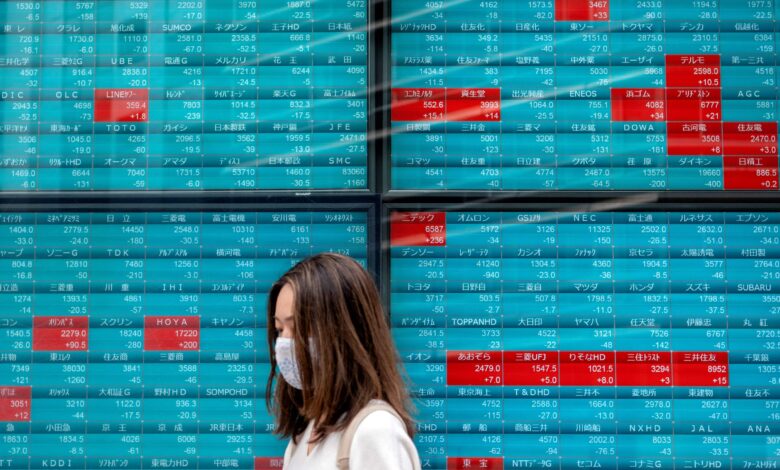Anxiety over Middle East hits global stocks

GLOBAL stock markets mostly sank on Tuesday (Apr 17) after Israel’s army chief vowed a response to Iran’s attack on his country, although oil prices held steady despite jitters that Israel could target energy infrastructure in key crude producer Iran.
Deep losses in Asia carried over into European trading, but Wall Street’s main indices wobbled as corporate earnings season continued.
“It has been another tough day for global markets, and limited gains in the US are disappearing as traders continue to derisk thanks to the ongoing uncertainty in the Middle East,” said Chris Beauchamp, chief market analyst at online trading platform IG.
“The threat of an Israeli response to Iran’s attacks on Saturday, and yesterday’s strong US retail sales data, remain the drivers of the declines,” he added.
Wall Street had tanked Monday partly in response to forecast-beating US retail sales data that reinforced the view that the world’s top economy remained in rude health and further dampened hopes for US interest rate cuts this year.
‘Heightened tensions’
“Sentiment is shaky at best right now with heightened geopolitical tensions in the Middle East, coming alongside increased concerns that the Federal Reserve may opt to maintain interest rates at the current levels for some time yet,” noted analyst Joshua Mahony at Scope Markets.
GET BT IN YOUR INBOX DAILY

Start and end each day with the latest news stories and analyses delivered straight to your inbox.
Tehran fired hundreds of missiles and drones at Israel on Saturday, saying the attack was retaliation for an Apr 1 strike on the consular annex of its Damascus embassy that killed seven Revolutionary Guards including two generals. It blamed Israel for the attack.
While air defence systems destroyed the vast majority of the barrage and Iran said “the matter can be deemed concluded”, Israel’s army chief General Herzi Halevi warned that there will be a response, fuelling worries of an escalation.
“The key for markets will now be the extent of the retaliation,” said Matthew Ryan, head of market strategy at financial services firm Ebury.
“Should Israel follow up with similarly ambitious missile attacks or, under a worse-case scenario, other nations become embroiled in the conflict, notably the US, then we would likely see a flight to safety in markets.
“The threat to global oil supply would also likely trigger a sharp move upwards in oil prices, which could comfortably jump above US$100 a barrel should investors fear a wider regional war.”
Oil prices edged higher Tuesday after sliding the previous day on hopes for a de-escalation with analysts say traders believe US pressure will keep any Israeli retaliation measured.
China’s mixed data
In Asia, traders digested figures showing Chinese expansion beat expectations in the first three months of the year but retail and industrial data came in well below par, suggesting leaders have much work to do to kickstart growth.
Investors appeared to ignore figures showing China’s economy grew 5.3 per cent in the first three months of the year, above the 4.6 per cent predicted in an AFP survey of analysts.
Other data reinforced worries about the outlook, with industrial production and retail sales coming in well below forecasts, ramping up worries about the prospects for the next quarter.
Shanghai stocks fell 1.7 per cent and Hong Kong 2.1 per cent. AFP


 Offers free spin
Offers free spin